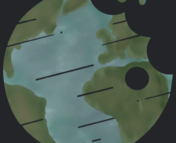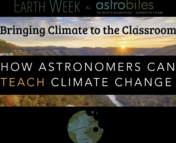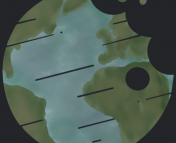For the final event in our Earth Week x Astrobites 2023 lineup, we held a panel discussion focused on answering the question “How do I as a [student/scientist/educator/science enthusiast] talk to people about climate change effectively?” In today’s bite, we provide a brief overview of the panel discussion, and share some key takeaways and resources.
If you missed the panel, you can find the recording of it here, as well as a closed caption transcript.
The panelists
Our first panelist was Dr. Shannon Schmoll (she/her), the director of the Abrams Planetarium at Michigan State University, and a board member for the Great Lakes Planetarium Association and the International Planetarium Society. She holds a joint PhD in astronomy and education from the University of Michigan, which focused on informal education in a planetarium setting, as well as a certification in museum studies. She integrates climate studies into her astronomy communication by situating the Earth as our home in space, and emphasizing its uniqueness and the importance of taking care of it.
Our second panelist was Dr. Gina Maffey (she/her), whose doctorate is in environmental science. While in academia, Gina was involved in science communication but felt increasingly disconnected from the environments she studied and was passionate about. In a project called the Wild Year, she and her husband lived outside for a year, and she began to think of habitat degradation and climate change as a breakdown of our relationship with nature. Her work focuses on helping people to connect with the natural world, keeping their feet in the dirt while keeping their minds on a global perspective.
Our third panelist, Dr. Natalya Gomez (she/her), is a professor of earth and climate science at McGill University in Montreal, Canada. Her journey in science communication began through communicating her own research to the public, and broadened from there to focus more on climate science in general. She’s interested in training the next generation, both scientists and members of the public, and she runs a number of courses, both at the university level and with a broader focus. Her goal in communicating climate science: getting people to talk together and think about what they can do in their own lives to help.
Our fourth panelist, Dr. Bernadette Rodgers (she/her), is a full-time climate activist living on Chinook land in Portland, Oregon. Her career as an astronomer at Gemini Observatory in Chile pivoted when she heard a colloquium in which John Lacey, the principal investigator for NASA’s SOFIA observatory, was pulling away from the project due to concerns about its greenhouse gas emissions. She organized the first AAS environmental splinter meeting in 2010, leading to the creation of the Sustainability committee, and has now built a career largely focused around climate activism.
Our fifth panelist was Dr. James Lowenthal (he/him), a professor of astronomy at Smith College. His climate activism uses the power of positive peer pressure; we as humans make primarily social decisions, not rational decisions. He works on conveying this knowledge to his astronomy students and employs it in his climate work, and emphasizes the importance of setting social norms that encourage caring about the Earth and the climate.
Our sixth panelist was Dr. Paul Fisher (he/him), who represents the ESA climate office in communicating climate science to national policy makers, other scientists, and the public. After a PhD in biology, he decided to build a career outside academia, and worked in environmental consultancy and PR before getting involved with ESA. In his work, he summarizes and explains ESA’s long-term global climate datasets, which are used by the United Nations Framework Convention on Climate Change and the Intergovernmental Panel on Climate Change in order to understand the scope of environmental change on a global level.
Finally, our seventh panelist, Dr. Anna Cabre (she/her), got her PhD in cosmology before pivoting to oceanography. Ocean warming is climate warming, so her career as an oceanographer naturally led to work in climate science. She eventually expanded her career outside academia by simplifying, educating, and communicating about climate science through many different formats and media, including everything from documentary to children’s books to diplomacy. She focuses on helping people to understand the information that is already out there–we have a wealth of climate research to draw on, so it’s important to be able to put it all together!
What goals do you have in mind when communicating climate change? How do you encourage engagement in your climate communication work?
The panelists agreed that while there is plenty of hard data, it’s often unnecessary or even actively detrimental to focus on information transfer over emotional engagement. Unless you are speaking to an audience of scientists who are specifically interested in the numbers, it’s much more important to get people to observe and connect with the environment around them, building a culture of caring about our home because it’s our home, not because of some numbers or a graph.
The climate crisis is real, and positivity is not always a realistic response. Many of the panelists discussed making space for their own anxieties as well as the anxieties of the people they’re talking to, meeting people where they’re at. But while it’s important not to downplay the magnitude of the problem, the panelists also agreed that one of the biggest problems facing us when it comes to climate change is not inevitability, but apathy. That’s a problem, but it can also be a source of hope—as long as we care about this, we can do something about it. The panelists mentioned the importance of motivating people to small actions in their own lives, which in turn can reduce apathy. As Dr. Lowenthal said, sometimes the action leads to the hope, not the other way around.
What are some of the challenges you have faced in communicating climate change? Do you face ecoanxiety in your work, and do you have any advice for addressing this?
While ecoanxiety is of course very prevalent, we humans have solved big problems before, including environmental problems like the ozone hole. We have the tools to solve this one too. In addition to inspiring and motivating people by getting them to connect with the world around them, it’s also important to remember that although the climate crisis is a structural problem, those structures are made up of people. Every little action counts.
It can be effective to connect these actions to tangible outcomes. For example, for every ton of carbon dioxide we put into the atmosphere we lose three square meters of sea ice–so through simple actions like taking public transport to work instead of driving once, we might save a whole square meter and a half. These things add up, and small things we do in our everyday lives (taking the bus, eating less meat, learning to repair our clothes) have a real impact on the environment! Dr. Rodgers brought up the ladder of engagement, a concept within activism that states that people are more likely to get involved with a cause at a lower level of commitment and then move up in scale. Small actions have a tendency to lead to larger actions such as communication, advocacy, diplomacy, and structural change.
While astronomy and climate science are often thought of as unconnected, a background in astronomy can actually be very helpful here! If you’re an astronomer or interested in astronomy, you’re used to being inspired by the pale blue dot we live on, and our smallness in the face of the Universe. It’s easy to jump from that sense of wonder to an understanding of the importance of taking care of our planet, and from there to action.
Do you have any advice for current physics/astro students interested in climate communication?
Go for it! While it’s inevitable that you’ll encounter people who don’t get it, it’s becoming more and more normal, expected, and even rewarded to care about climate change. Many people in hiring committees will respond positively to climate-related work on a CV, and studies show that fears of negative professional repercussions due to climate activism are largely proven false.
The panelists agreed that it’s important to find personal and professional support systems when you’re engaging in activism and advocacy, whether that means joining an existing organization or starting the conversation yourself and seeing who else around you is interested in the same kind of work. Plenty of organizations exist for people who want to engage more in climate advocacy. Multiple panelists mentioned Astronomers for Planet Earth, and organizations like Scientist Rebellion can also help build community with scientists across disciplines.
The young people of today are the scientists, educators, and activists of tomorrow, and if we don’t work to build a better world, who will?
Additional resources:
- ESA animations of climate data
Astrobite edited by: Olivia Cooper
Featured image credit: Suchitra Narayana
This article was written as part of our Climate Change Series. We’d love to hear what you would like to see from this initiative – if you have ideas, please let us know in this google form. Find last year’s Earth Week page here.




